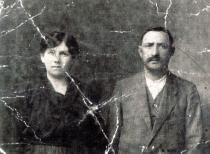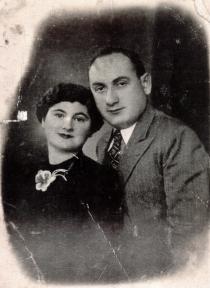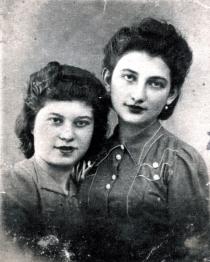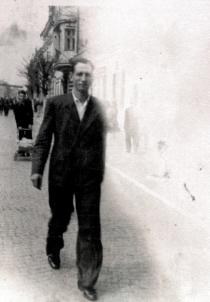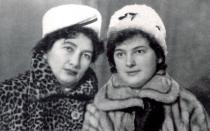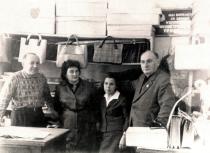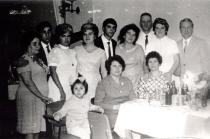This is a picture of my older brother, Khuna Barenboim,and his wife Genya Barenboim [nee Khais]. This photo was taken at the beginning of their married life in 1935 in Kishinev.
Khuna worked at a leather goods factory. He started working when he turned 11. He became a qualified specialist and earned good money. The owner of the factory was a Jew and only hired Jews. My brother had a fiancé, who was also a Jew. Her name was Genya Khais. Later we called her Zhenya. They were dating for six years: for two years before my brother went into the army and two years during his service in the Romanian army. A year after his return from the army my brother got officially engaged, and a year after that they got married. My brother said that he wouldn't get married until he could provide for his family on his own. He rented an apartment and bought furniture. After that, in 1935, they had their wedding.
The wedding was a traditional Jewish wedding. The celebrations weren't what they are now - in a restaurant until midnight - they lasted until morning back then. There were special wedding halls or people booked a large tavern. There were poorer weddings and richer weddings, and the number of guests depended on the size of the family. Since my father had five married sisters, they, along with their husbands and children and grandchildren, were invited, as well as my father's and my brother's co-workers. It was a large wedding with close to a hundred people. A chuppah was erected in the hall. The fathers of the bride and the groom led the groom to the chuppah. A rabbi said a prayer and the bride and the groom exchanged rings. They were given a shot of vodka and a piece of cake and the ceremony was complete.
Food for the wedding was prepared by women, who were especially invited and referred to as sarvern [Yiddish for 'cook']. They prepared Jewish dishes like gefilte fish, chicken, and sweet and sour stew. The stew was always served with maina, a pie that is prepared in the same way as strudel and made from the same dough, but the filling is minced meat mixed with home-made noodles and fried onions. The dough was most delicate and very difficult to roll. Maina and strudels were prepared by a highly skilled cook who didn't prepare any other food. The guests were served vodka and cake immediately after the ceremony, and afterwards everyone sat down. The tables were already catered with gefilte fish, which was always served with horseradish. After the fish, chicken broth, maina, boiled chicken and stew were served. Vodka and wine completed the meal. Later everyone danced. Klezmer musicians were invited and played all night long, so the dancing continued all night long. It started with the traditional sher, danced by everyone, the young and the old. Sher is danced in pairs; man and woman dance together. It can last for two hours. After that the klezmer musicians played Jewish and Moldovan music, tangos and waltzes. We danced all night. And then sweets were served. Weddings were always held on Sundays, and Saturdays before a wedding were called freilekher Shabbat, or happy Saturday. Guests visited the groom and bride with wedding gifts. Giving money wasn't customary. Gifts were things that the newly-weds would need to start their own home such as dishes, cutlery, household items, bed-linens and so on.

